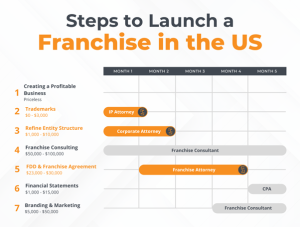Investing in a franchise can be a life-changing decision, offering the promise of business ownership with the support of an established brand. However, it is crucial to approach this opportunity with caution and diligence. The franchise disclosure documents (FDD) provide vital information about the franchise you are considering. In Ontario, the Arthur Wishart Act (Franchise Disclosure), 2000, a law that protects franchisees, mandates that franchisors disclose comprehensive information to prospective franchisees before they sign any agreements or make payments. Understanding what to look for in this set of documents can help protect your investment and set you up for success. Here are five essential elements to ensure are covered in your disclosure agreement.
Detailed background information about the franchisor, its business, and systems
The first step in your journey as a prospective franchisee is to obtain a complete disclosure document from the franchisor. According to the Arthur Wishart Act, you must be provided a cooling off period of at least 14 days before you sign any contracts or make payments. A thorough review of the disclosure document is crucial because it should contain all the necessary information about both the franchisor and the franchise offer.
The document should detail the franchisor’s business background, including its operational experience, any legal disputes, litigation history, and bankruptcy or insolvency information. Understanding the franchisor’s background can help you assess their stability and reliability.
Generally, the disclosure document must include the franchisor’s financial statements for the most recent fiscal year. These statements should be prepared on at least a “review-engagement” basis, which is a higher standard than compilation engagement basis but is lower than an audit standard. Look for details about the franchise system’s assets, liabilities, and overall financial health. Review the financial information with the help of a professional such as a chartered accountant.
Review all costs associated with the franchise carefully. This includes upfront fees, ongoing royalties, advertising contributions, and any additional expenses (e.g. software costs, delivery fees, service charges, administration fees, training costs, management fees, etc.) that may be incurred as a franchisee. Understanding these costs upfront can help prevent unexpected financial burdens later on.
The document should also specify any training programs provided by the franchisor, along with ongoing support. This includes details about initial training sessions, marketing assistance, and operational guidance. Adequate support is crucial for your success as a franchisee.
The FDD will also list all the franchisor’s registered trademarks, including logos, catchphrases, taglines, and coined terms. If the franchisor lacks registered trademarks or if the trademarks are under dispute, franchisees might incur expenses to alter marks that infringe on those owned by others.
A complete disclosure document is not just a legal formality; it serves as a critical tool for making an informed decision. If you do not receive this document or if it fails to meet legal requirements, you may have rights to cancel the agreement without penalty.
Detailed franchise rights, rules, expenses, and legal agreements
Beyond the broad information about the franchisor’s background, the disclosure document must contain all the details about the franchise offer. This includes all associated costs (deposits, fees, expected expenses, and other financial obligations), the full text of proposed franchise agreements, lease agreements, head leases, descriptions of any exclusive territories, and specific restrictions you’ll be expected to adhere to, such as obligatory purchases from designated suppliers. The franchisor’s policies on volume rebates, conditions surrounding contract termination, renewals, franchise transfers, premises, their dispute resolution processes (i.e. mediation and/or arbitration), training, support programs, and advertising fund contributions should also be discussed. It’s essential to have a lawyer thoroughly review the franchise disclosure package, especially any legal documents, before signing anything. Franchise agreements often favor the franchisor, so it’s crucial for franchisees to fully understand all aspects of the franchise relationship they plan to enter.
Finally, the FDD must be provided to you in a single time and not over time. The FDD must be provided with all documents you are required to review and sign.
Transparent disclosure
The FDD must include a certificate signed by the franchisor’s officer or director. If there are multiple officers or directors, at least two must sign. This certificate confirms that the FDD contains no false information and includes all required material facts and financial statements as per the Arthur Wishart Act. Courts have invalidated FDDs, leading to rescission of franchise purchases, due to missing, unsigned, or improperly signed franchisor certificates.
Understanding “material changes” is crucial to your rights as a franchisee. A material change is any alteration that could significantly impact the franchise’s value or your decision to buy it. The franchisor must legally inform you of any such changes occurring after you receive the disclosure document but before you sign the agreement or pay. These changes might involve business practices, legal issues, or adjustments to fees and costs. If the franchisor fails to notify you, you may have legal recourse.
Understanding your rights and remedies
Understanding your rights regarding cancellation is essential before signing any agreement. The disclosure agreement should clearly outline the circumstances under which you can cancel due to incomplete or late disclosures.
If you receive a disclosure document that is late or incomplete, you have up to 60 days after receiving it to cancel the agreement without penalty. If no disclosure document is provided at all, you may cancel the agreement up to two years after entering into it.
These provisions are designed to protect franchisees from being bound by agreements based on inadequate or misleading information. It is vital to be aware of these timelines and exercise your rights if necessary.
If you suffer financial losses due to an incomplete or misleading disclosure document or if there are misrepresentations within it, you may have the right to take legal action for damages. This could include claims against the franchisor for any losses incurred due to their failure to provide accurate and complete information.
Discussions with existing franchisees
One of the most effective ways to gauge whether a franchise opportunity is right for you is by talking with current and former franchisees listed in the disclosure document. Their experiences can provide invaluable insight into what it is really like running that business.
When reaching out to other franchisees, consider asking about their cost expectations, sales quotas, product supply, franchisor support received, conflict resolution processes, and whether they would choose this franchisor again. Engaging in these conversations can illuminate both positive and negative aspects of operating under that franchise brand. The insights gained from existing franchisees can help you weigh your options more effectively.
Concluding thoughts: Empower your franchise journey
Investing in a franchise is a major commitment requiring careful review of the franchise disclosure agreement. Thoroughly covering five critical areas can help you make informed decisions and protect your investment from pitfalls. Always consult legal and financial professionals before signing. Understanding your rights as a franchisee is essential for success. A well-researched investment can be rewarding, while neglecting key details can lead to costly errors. Take your time, ask questions, and ensure the franchise opportunity aligns with your business goals and expectations. Your success depends on it.








